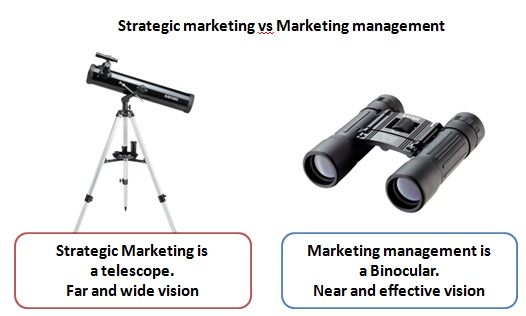Most of our readers get confused between Strategic marketing and marketing management. This article sets out to differentiate between both of them and explain to you what is the role of strategic marketing as well as the role of marketing management.
Strategic marketing and marketing management are similar yet different in various ways. The best way to explain this would be an example.
Company X is a FMCG company. It has 10 brands in its portfolio. The job of marketing management in this case will be to define the marketing mix and the segments for these 10 products in the portfolio. At the same time, designing the promotional mix, advertising and brand building fall under the domain of marketing management.
However, the job of strategic marketing in the case of company X will be to find out the competitors in the market, find out the most profitable segments, and how to convert those segments into cash cow. Similarly, if a 11th segment is to be explored, or one of the product has to be removed from the portfolio, will also be decided by strategic marketing. SWOT analysis, market entry, market exit, product decisions, and other such decisions fall under the domain of strategic marketing.
In essence, the day to day activities of marketing fall under “Marketing management”. Whereas, the long term activities of marketing fall under “Strategic marketing”.
Thus, if you plot the differences of Strategic marketing and marketing management, then the following are the differences.
| Difference |
Marketing management |
Strategic marketing |
| Time | Short term / Maximum a year’s time frame | Long term / Minimum 3 years time frame |
| Mission | To build a brand and market the company | To drive the company in the right direction |
| Decision making | Bottom to top approach | Top to bottom approach |
| Opportunities | Establishing the existing opportunities into set business | Searching for new opportunities from existing business |
| Job profile | Requires control, discipline and proactiveness | Requires vision, creativity, and risk taking ability |
| Business environment | Is considered stable with minor hindrances | Is considered unstable, with technology and external factors as ever present enemies. |
| Leadership | The leader needs to react to the market | The leader needs to be proactive before the market reacts |
| Competition / external factors | Are clear and defined | Are unclear and dynamic |
As can be seen from the table above, it is clear that the objectives of marketing management are short term and hence marketing can be said myopic at times when no one is working on strategic management.
In the movie, World war Z, there is a concept explained of the tenth man. Where 9 men agree on a concept, it is the work of the 10th man to disagree and to do research on the topic. Strategic marketing is like the 10th man. If all is going well, Strategic marketing has to assume that something will go wrong and work from there.
This does not undermine the work of marketing management. They are 2 inter dependent yet equally important functions in an organization. If strategic marketing finds a product, then without the help of marketing management, the product will not get established in the market and it is vice versa too.
Thus, as the firm grows, the company needs two sub departments within marketing at all times – Strategic marketing and marketing management.
Liked this post? Check out the complete series on Strategy

hello,
my name is Emmanuel Kwarteng Amaniampong and a potential PhD Marketing. my topic is; Strategic marketing practices and firms’ performance, the focus will be on SMEs in Ghana. would you be of help to me by assisting me on this project. i am about to write my proposal next month.
thank you
signed
Kwarteng writes
Hi,
I am a potential marketing student can you tell me the future opportunities in the field of strategic marketing as compared to traditional marketing.
hi
My name is PAUL i am doing marketing management degree, so wanted to ask for help on the impact of customer centric strategy on customer satisfaction